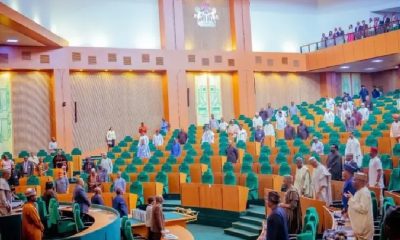News
Court dismisses N5bn suit by Chinese fraud suspects against EFCC

By Francesca Hangeior.
The Federal High Court in Abuja on Thursday dismissed a N5 billion suit brought by 110 alleged internet fraudsters against the Economic and Financial Crimes Commission for lack of merit.
The presiding judge, Justice James Omotosho, dismissed the suit because the applicants failed to prove they had been unlawfully detained after taking arguments from both parties.
In an originating motion marked FHC/ABJ/CS/80/2025, the applicants sued the EFCC and its Executive Chairman, Mr Ola Olukoyede.
The applicants are Zhang Xiaowen, Liu Zhiwei, Chen Yeqiu, Lan Shunbin, Abubakar Hassan, Igwe Ozioma, Gabriel Shimlumun, Abdulmuminu Usman, Olamide Olatoye, Jeremiah Abele, Asule James, Bitrus Joseph, Odeh Abel, Jathan Jayock, Jackson Samson, Isiaq Olanrewaju, Adejor Isah, Salihu Suleiman, Joseph Ojoma, Tanko Isah, Omoyele Ebenezer, Olisakwe Chieme, Ohikwo Fatima Musa, Faith Agada, Opara Cynthia, Blessing Thomas and Rachel Habila.
The group, which includes four Chinese nationals, was arrested inside a building in the Katampe District of Abuja on January 9.
According to the EFCC, the arrests followed intelligence reports suggesting the individuals were involved in fraudulent activities, including internet scams.
The agency further alleged that the Chinese nationals had recruited Nigerians to participate in a fraudulent cryptocurrency scheme.
The EFCC stated that while the suspects coordinated their operations from Nigeria, they used virtual private networks (VPNs) to defraud victims in the United Kingdom, posing as hoteliers.
Following their arrest, the applicants hired a legal team led by Ishaka Dikko (SAN) to enforce their fundamental human rights.
The applicants accused the EFCC of violating their rights to dignity, personal liberty, and fair hearing, as enshrined in Sections 34, 35, 36, 43, and 46 of the 1999 Constitution, as amended.
They asked the court to declare that their detention from January 9 to 16 exceeded the constitutionally prescribed period and was therefore illegal and unlawful.
They sought ₦5 billion in damages.
The applicants also requested the court to declare that the seizure of their international passports—numbers E55480652, EL6128848, E91567245, and E99903655—during their detention was unlawful and contrary to Sections 36, 43, and 44 of the 1999 Constitution, as amended.
Their lawyer argued that evidence before the court showed the EFCC obtained a remand order on January 10 and renewed it on January 24, after the initial order expired.
Responding, Justice Omotosho held that the remand orders were legally permissible, given the allegations that the applicants’ actions posed a threat to national security.
The judge also noted that the EFCC’s decision to grant administrative bail demonstrated it had no intention of detaining the applicants indefinitely.
He stated that the commission could not be held liable for the applicants’ failure to meet the bail conditions.
Justice Omotosho subsequently dismissed the fundamental rights enforcement suit and urged the applicants to respond to the allegations against them, which were deemed a threat to national security.
News
IGP Egbetokun orders his men to resume issuance of tinted glass permits

The Inspector-General of Police, Kayode Egbetokun, the Nigeria Police Force has directed his men to resume the issuance of tinted glass permits across the country.
This development was announced in a statement released on Wednesday by the Force Public Relations Officer, Olumuyiwa Adejobi.
According to the Force spokesperson, the move comes in response to rising concerns and complaints from the public over the harassment of vehicle owners by law enforcement agents for using factory-fitted tinted windows.
“The Nigeria Police Force, under the directive of the Inspector-General of Police, IGP Kayode Adeolu Egbetokun, Ph.D., NPM, has reactivated the issuance of Tinted Glass Permits (TGP) nationwide through a secure and user-friendly digital platform.
“This initiative comes in response to widespread public complaints about the harassment of motorists over the use of tinted windows and reflects the need for a clear, transparent, and accountable process for regularising factory-fitted tinted glass on vehicles”, the statement partly read.
Highlighting the prevalence of modern vehicles designed with tinted windows for comfort and aesthetics, the police emphasised the importance of having a formal system to regulate usage.
“With modern automobiles increasingly manufactured with tinted windows, it has become essential to provide a standardised system that accommodates legitimate use while ensuring public safety.
“Tinted vehicles have often been exploited for criminal purposes, including kidnapping, armed robbery, ‘one-chance’ scams, and other forms of banditry”, Adejobi explained.
According to the statement, the abuse of tinted windows by criminals creates operational challenges for law enforcement and compromises national security.
In addition, he explained that law enforcement will begin active implementation after the grace period, and the police warn that officers who misuse the enforcement process will be sanctioned.
“Enforcement will commence at the end of this period. Officers found engaging in unprofessional conduct, such as extortion or harassment, in the course of enforcement will be decisively dealt with in accordance with extant disciplinary procedures”, he said.
News
Spokesperson Warns Nigerians Against Fake Ministry Of Foreign Affairs Recruitment Scam

By Gloria Ikibah


News
CBN announces revised documentation requirements for PAPSS transactions

The Central Bank of Nigeria (CBN) has announced a revised documentation requirement for transactions conducted through the Pan-African Payment and Settlement System (PAPSS) in Nigeria.
This was disclosed in a statement issued by the apex bank’s acting Director, Corporate Communications, Mrs. Hakama Sidi Ali
The CBN said the new initiative is part of its ongoing commitment to foster seamless intra-African trade, financial inclusion, and operational efficiency for Nigerians engaging in cross-border payments within Africa.
Launched by Afreximbank in partnership with the African Union and the African Continental Free Trade Area (AfCFTA) secretariat in January 2022, PAPSS serves as a centralized payment and settlement platform that enables instant, secure, and efficient cross-border transactions throughout Africa.
By facilitating payments in local currencies, PAPSS minimizes reliance on third-party currencies, reduces transaction costs, and supports the rapid expansion of trade under the AfCFTA.
In a recent circular referenced TED/FEM/PUB/FPC/001/006 issued on April 28, 2025, CBN outlined the key changes to the documentation requirements associated with PAPSS transactions.
The key changes it added take effect immediately and include simplified documentation for low-value transactions, which allows customers to now use basic KYC and AML documents provided to their authorized dealer banks for low-value transactions of up to $2,000 and $5,000 equivalent in naira for individuals and corporate bodies, respectively.
“For transactions above the thresholds, all documentation as stipulated in the CBN foreign exchange manual and related circulars remains mandatory,” the bank said.
Also, the CBN added that applicants are responsible for ensuring all regulatory documents are available to facilitate the clearance of goods, as required by relevant government agencies.
“Authorized dealer banks may now source foreign exchange for PAPSS settlements through the Nigerian foreign exchange market, without recourse to the CBN.
“All export proceeds repatriated via PAPSS shall be certified by the relevant processing banks.
“The Central Bank of Nigeria urges all banks to adopt PAPSS and commence originating transactions in line with this new policy.
“In addition, CBN encourages exporters, importers, and individuals to familiarize themselves with the new requirements and leverage PAPSS for cross-border transactions within Africa,” the statement said.
-

 Metro12 hours ago
Metro12 hours agoGunmen storm University of Benin teaching hospital, kill doctor
-

 Metro12 hours ago
Metro12 hours agoFCTA destroys 601 motorbikes over violations
-

 News12 hours ago
News12 hours agoJust in: FG declares tomorrow public holiday
-

 News4 hours ago
News4 hours agoAlleged money laundering: EFCC produces Aisha Achimugu in court
-

 News24 hours ago
News24 hours agoDeputy Speaker Leads Defection of PDP Stalwart Chris Igwe, 13,000 Followers to APC In Abia
-

 News5 hours ago
News5 hours agoJUST IN: Major General Paul Ufuoma Omu Rtd, dies at 84
-

 News8 hours ago
News8 hours agoSAD! Professor’s son takes own life inside varsity staff quarters
-

 News12 hours ago
News12 hours agoFull list: FG approves N110bn to rehabilitate medical schools 18 institutions


















